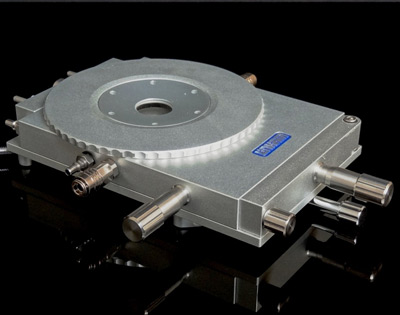Jun 13 2012
Market leaders in temperature controlled microscopy, Linkam Scientific Instruments report on the use of their THMSG600 by scientists at the University di Parma, Italy.
Using a THMSG600 Linkam stage, scientists at the Department of Physics and Earth Science from the University of Parma are investigating gold deposits from the Lepaguare valley mining district, Honduras.
 The Linkam THMSG600 stage used at the University di Parma to study gold deposits
The Linkam THMSG600 stage used at the University di Parma to study gold deposits
The Lepaguare is within a mountain belt that hosts several precious metal vein deposits and extends from Guatemala to Costa Rica through the Honduras region. These deposits mainly consist of gold and sulphide and are associated with thick quartz veins within pre-Mesozoic metamorphic rocks. Inside the veins, the quartz crystals are rich in fluid inclusions (FI) which can be studied to provide an understanding of the history of the gold deposits.
FI offer the possibility of reconstructing the environmental conditions (pressure, temperature, oxygen fugacity) and give information on the composition of the supercritical fluids in the environment during mineral formation. The Honduras region is of interest to geologists as it has a complicated geodynamic evolution, due to complex interactions between the North American and South American plates. Hydrothermal fluids are connected with granitoid intrusions and are controlled by the repeated foliation, fracturing and shearing of host rocks in the area resulting in significant mineralogical and geochemical anomalies.
These fluid inclusions have been studied using a THMSG600 Linkam stage to try to understand the composition of the fluids entrapped in quartz crystals. Using micro-thermometry and micro-Raman spectroscopy, scientists have investigated the physical and chemical conditions and chemical composition of the mineralizing fluids. A Linkam THMSG600 stage (placed on the rotating stage of a transmitted optical light microscope) is used to take micro-thermometric measurements on the inclusions. Micro-thermometry consists of freezing runs to -196°C followed by heating runs up to 600°C, which test the composition of the fluids (freezing runs) and mimic the conditions of their entrapment (heating runs). Micro-thermometry indicates entrapment temperatures of mineralizing fluids of 210-413°C and, associated with Raman spectra, the composition H2O-NaCl-KCl-CO2-CH4 for the mineralizing fluids. Due to temperature decrease and thermal contraction between mineral host and mineral fluid, they form daughter phases, which may be formed of one or more liquids, one vapour bubble, and possibly solid phases e.g. salts.
Emma Salvioli-Mariani, a researcher at the University of Parma, explains "I am using the heating/freezing stage THMSG600 to understand the pressure and temperature conditions of mineral and rock formation, and to study fluid content of magma and the magma evolution. I find the possibility of programming the heating cycles with different ramps, the greater control on the heating and cooling rate and the ease of loading the sample just some of the advantages of using the Linkam stage."
Visit Linkam at http://www.linkam.co.uk/ and learn about the broad range of applications in the field of temperature controlled microscopy.